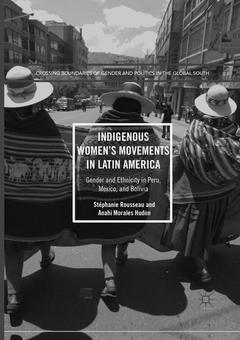Indigenous Women's Movements in Latin America, Softcover reprint of the original 1st ed. 2017 Gender and Ethnicity in Peru, Mexico, and Bolivia Crossing Boundaries of Gender and Politics in the Global South Series
Auteurs : Rousseau Stéphanie, Morales Hudon Anahi

Proposes a new perspective on indigenous movements based on a gendered framework of analysis
Provides a detailed analysis of the relations between global North and global South through the lens of gender
Offers new insights in the gendered dimensions of migration and global labour regimes
Date de parution : 07-2018
Ouvrage de 225 p.
14.8x21 cm
Disponible chez l'éditeur (délai d'approvisionnement : 15 jours).
Prix indicatif 147,69 €
Ajouter au panierThèmes d’Indigenous Women's Movements in Latin America :
Mots-clés :
Indigenous people; Indigenous women; Women's movement; Latin America; Gender; Ethnicity; Peru; Mexico; Bolivia; latin american politics



